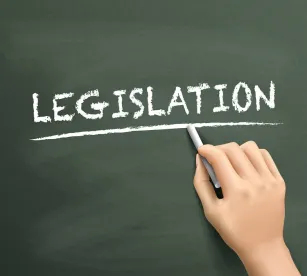This past year, the California Legislature enacted a number of new laws that either took effect immediately or will become effective in 2016. Among the most significant are the following:
AB 1506: Employers Given Time to Fix Wage Errors
Assembly Bill No. 1506, signed as an urgency law earlier this year, immediately amended the California Private Attorneys General Act of 2004 ("PAGA") to allow employers to cure certain technical violations of the wage statement requirements of California Labor Code Section 226.
The new law specifically addresses only the wage statement requirements of listing the inclusive dates of the pay period and the name and address of the legal entity that is the employer. Upon receiving written notice from an aggrieved employee alleging that a wage statement did not comply with these specific requirements, an employer now has the ability to cure the alleged defects within a 33-day period. If the employer does so, no civil PAGA action can commence. The Legislature intended this new law to avoid frivolous litigation over technical violations, and the curing provisions can be a major tool for employers to avoid civil litigation over such technical defects of a wage statement.
If an employer receives a notice from the Labor Commissioner or from an aggrieved employee of such violations, it should contact employment counsel immediately to determine strategically: (1) whether to cure an alleged defect; (2) if so, how to cure the defect (consistent with the requirements for curing under PAGA); and (3) how to take into account other considerations (such as protecting employee privacy and confidential information).
AB 304: California Clarifies Its Sick Leave Law
While employers throughout the state have struggled with the new requirements set out by the Paid Sick Leave Law that took effect July 1, 2015, new amendments to the law attempt to provide some clarification.
On July 13, 2015, Governor Brown signed into law AB 304, which clarifies the permissible accrual methods an employer may use in calculating sick leave pay. The new amendments were effective immediately.
Given the recent changes and this emerging area of law, employers should review their sick leave policies for compliance with this new law if they have not done so already.
AB 987: Retaliation for Requesting Reasonable Accommodation Prohibited
California has amended its Fair Employment and Housing Act ("FEHA") to prohibit retaliation against an employee for requesting accommodation of his or her disability or religious beliefs. Assembly Bill 987 overturns Rope v. Auto-Chlor System, 220 Cal.App.4th 635 (2013), in which a California appellate court ruled that requests for accommodation, without more, did not constitute a protected activity under FEHA. The amendment, effective January 1, 2016, allows employees to claim retaliation because they requested an accommodation of their disability or religious reliefs, regardless of whether the accommodation request was actually granted. Accordingly, employers assessing risks relating to potential adverse employment actions should continue to be mindful regarding circumstances in which an employee has requested accommodation of disability or religious beliefs (even if the request was denied).
AB 1509: Employer's Liability for Retaliation Expanded to Include Employee Family Members
Assembly Bill No. 1509, which takes effect on January 1, 2016, expands an employer's liability for retaliation against an employee who is a family member of another employee engaged in protected conduct. It will amend three California Labor Code sections that currently prohibit retaliation against employees engaged in different types of protected conduct: (i) Section 98.6 (complaints to Labor Commissioner); (ii) Section 1102.5 (whistleblower activities); and (iii) Section 6310 (reporting health and safety violations).
Existing California law protects employees engaged in protected activity from retaliation by employers. Assembly Bill No. 1509 extends that protection to employees working for the same employer who are family members of individuals engaged in protected activity. For example, if a husband and wife work for the same employer, and the husband engages in protected whistleblowing activity, Assembly Bill No. 1509 prohibits the employer from taking any adverse action against the wife in retaliation for the husband's actions.
To plan for Assembly Bill No. 1509, employers should consider revising their anti-retaliation policies (e.g., in an employee handbook) to include a prohibition on retaliation against family members of employees who engage in a protected activity. Employers also should consider incorporating discussion of this prohibition into any anti-retaliation training they provide to managers. Additionally, given the prevalence of retaliation claims in employment lawsuits, employers should carefully assess the impact of any corrective action taken against an employee whose family member has asserted complaints or engaged in any other type of protected conduct.
SB 588: Expanded Individual Liability For Owner, Director, Officer or Managing Agent
Senate Bill No. 588, the "California Fair Day's Pay Act," amends or adds 13 statutory sections to California's Labor Code or Code of Civil Procedure. The Legislature's stated purpose for amending or adding those various statutory provisions is to address the "wage theft" issue. Thus, Senate Bill No. 588, effective January 1, 2016, now gives the Labor Commissioner additional rights and remedies typically available to judgment creditors (such as property liens and bank levies) to enforce awards issued by the Labor Commissioner against employers.
More importantly, Senate Bill No. 588 creates additional potential liabilities to successor employers and to any person acting on behalf of an employer. First, any employer which is similar in operation and ownership to a prior employer which has been deemed liable for wage and hour violations may be held liable for those violations of the prior employer. Second, under Senate Bill No. 588, current or former employees now may seek to impose liability for wage and hour violations of an employer on any person acting on behalf of "the employer." This means that an owner, director, officer or managing agent could be personally liable for their employer's failure to comply with any of the numerous requirements set forth in California's Labor Code or Industrial Welfare Commission Wage Orders.
Senate Bill No. 588 is further reason to make sure that businesses are fully compliant with all wage and hour obligations (such as minimum wage, overtime, meal period and rest break, business reimbursement, etc.) under California law.
SB 358: California Fair Pay Act
Effective January 1, 2016, the new "California Fair Pay Act" will provide California employees with greater protection against gender wage inequality. Under existing law (Section 1197.5 of the Labor Code), California's "Equal Pay" Act generally prohibits employers from paying any employee at wage rates less than the rates paid to employees of the opposite sex in the same establishment for equal work on jobs the performance of which requires equal skill, effort and responsibility.
The new "Fair Pay" Act changes the comparative analysis from "equal work" to "substantially similar work" and eliminates the "same establishment" requirement. Substantially similar work is viewed as a composite of skill, effort and responsibility when performed under similar working conditions.
The Fair Pay Act requires that an employer affirmatively demonstrate that wage differentials are based on lawful, nondiscriminatory factors such as: (i) a seniority system; (ii) a merit system; (iii) a system that measures earnings by quantity or quality of production; or (iv) a bona fide factor other than sex. The new law also includes an anti-retaliation provision which prohibits employers from taking adverse action against any employee who invokes or assists in the enforcement of the Fair Pay Act.
In light of these revised statutory requirements, prudent employers will review their existing compensation systems, as well as job descriptions, to assess the potential for any gender wage inequality claims. Human resources and organizational development personnel should also take steps to train and educate managers and supervisors on compensation policies and structures.
AB 970: Expands Enforcement Authority of Labor Commissioner
Assembly Bill No. 970, effective January 1, 2016, expands the enforcement authority of the Labor Commissioner regarding California laws governing overtime (Labor Code Section 558), minimum wage (Labor Code Section 1197.1) and expense reimbursement (Labor Code Section 2802).
In jurisdictions where a local entity has authority to issue a citation against an employer for a violation of any applicable local minimum wage or overtime law, Assembly Bill No. 970 authorizes the Labor Commissioner to investigate and, upon request by the local entity, issue citations, provided the local entity has not previously cited the employer for the same violation. If the Labor Commissioner issues a citation, the local entity cannot cite the employer for the same violation.
Existing law permits a private right of action by employees for failure to indemnify for necessary expenditures or losses incurred in direct discharge of the employee's duties or at the direction of the employer under Labor Code Section 2802. Assembly Bill No. 970 now authorizes the Labor Commissioner to issue citations and recover penalties against an employer (or other person acting on behalf of the employer) for such violations.
AB 1513: Piece Rate Compensation
Assembly Bill No. 1513, effective January 1, 2016, introduces certain requirements regarding piece-rate compensation and repeals obsolete provisions requiring certain workers' compensation studies. Specifically, this new law adds Labor Code Section 226.2, which states that employees shall be compensated for rest and recovery periods as well as "other nonproductive time" separate from any piece-rate compensation. Section 226.2 also requires that, in addition to the wage statement requirements of Labor Code Section 226, employers must provide employees compensated on a piece-rate basis with itemized statements separately stating:
-
the total hours and rate of compensation for compensable rest and recovery periods;
-
the gross wages paid for those rest and recovery periods during the pay period;
-
the total hours and rate of compensation for other non-productive time; and
-
the gross wages paid for that non-productive time during the pay period.
Section 226.2 defines "other non-productive time" as time under the employer's control, aside from rest and recovery periods, that is not directly related to the activity compensated on a piece-rate basis.
Section 226.2 also requires employers to compensate employees for rest and recovery periods at a rate no less than the greater of: (i) the average hourly rate determined by dividing the total compensation for the workweek, exclusive of compensation for rest and recovery periods and any premium compensation for overtime, by the total hours worked during the workweek, exclusive of rest and recovery periods; or (ii) the applicable minimum wage. Other non-productive time shall be compensated at a rate at least equal to the applicable minimum wage.
Section 226.2 provides an employer with an affirmative defense to any claim based solely on an employer's failure to compensate the employee for rest and recovery periods and other non-productive time for periods up through December 31, 2015. To take advantage of this affirmative defense, there are various statutory requirements that need to be met no later than December 15, 2016.
AB 622: Employers Now Face California Labor Code Penalties For Misusing The Federal E-Verify Process
Effective January 1, 2016, Assembly Bill No. 622, codified as California Labor Code Section 2814, prohibits a California employer from "using the E-Verify system at a time or in a manner" that is not required by federal law or authorized by a federal agency memorandum of understanding. In other words, the new law is a state law ban on the misuse of the E-Verify system.
In addition, when employers use the E-Verify system to check the authorization status of a person, Section 2814 requires the employer to provide the person "as soon as practicable" with any notification issued by the Social Security Administration or the United States Department of Homeland Security specific to their E-Verify case or any tentative non-confirmation notice. Employers who violate this law are subject to a civil penalty of $10,000 for each violation.
California employers should review their E-Verify procedures to ensure that they are in full compliance with federal law and federal guidance materials.




 />i
/>i
